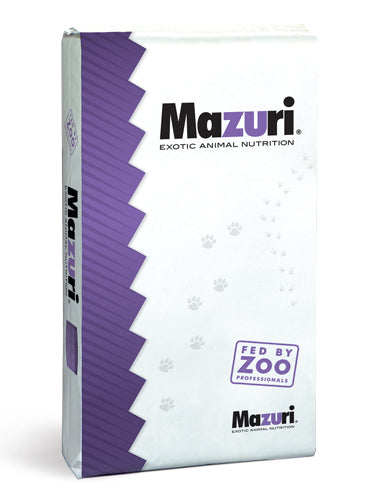Every exotic animal deserves the right nutrition
| Crude protein not less than Crude fat not less than Crude fat not more than Moisture not more than Ash not more than Calcium not less than Calcium not more than Phosphorus not less than |
20.0% 3.0% 18.0% 12.0% 8.5% 0.75% 1.25% 0.60% |
Dehydrated Alfalfa Meal, Dehulled Soybean Meal, Wheat Middlings, Ground Soybean Hulls, Ground Timothy Hay, Ground Oats, Dried Plain Beet Pulp, Cane Molasses, Wheat Germ, Dicalcium Phosphate, Ground Flaxseed, Soybean Oil, Salt, Calcium Carbonate, DL-Methionine, Choline Chloride, Pyridoxine Hydrochloride, Magnesium Oxide, Folic Acid, d-Alpha Tocopheryl Acetate, L-Ascorbyl-2-Polyphosphate (Vitamin C), Vitamin A Acetate, Corn Distillers Dried Grains with Solubles, Vitamin D3 Supplement, Yeast Culture, Dried Enterococcus faecium Fermentation Product, Dried Lactobacillus acidophilus Fermentation Product, Gelatin, Dried Aspergillus oryzae Fermentation Extract, Dried Trichoderma longibrachiatum Fermentation Extract, Dried Bacillus subtilis Fermentation Extract, Manganous Oxide, Calcium Pantothenate, Zinc Oxide, Ferrous Carbonate, Copper Sulfate, Nicotinic Acid, Vitamin B12 Supplement, Riboflavin Supplement, Zinc Sulfate, Calcium Iodate, Sodium Selenite, Cobalt Carbonate.
Adult Chinchillas will eat approximately 20 grams (2 tablespoons) of pellets per day with an unlimited amount of good quality grass or hay. Juveniles and lactating females should have unlimited pellets per day. Supplemental vegetables and fruits are not required in the diet, but if offered should be limited to less than 10% of the total diet and treats offered at less than 2% of total diet.
Ask Our Experts
Get nutrition advice you can trust from experts who understand the unique nutritional needs and behaviors of your exotic animals.
Get Advice